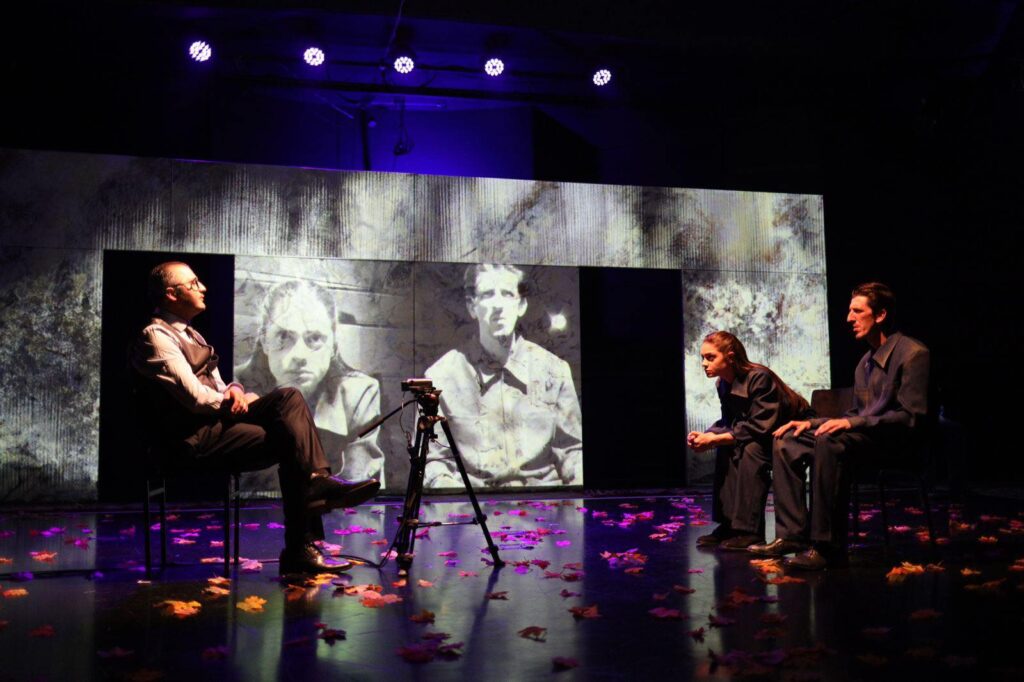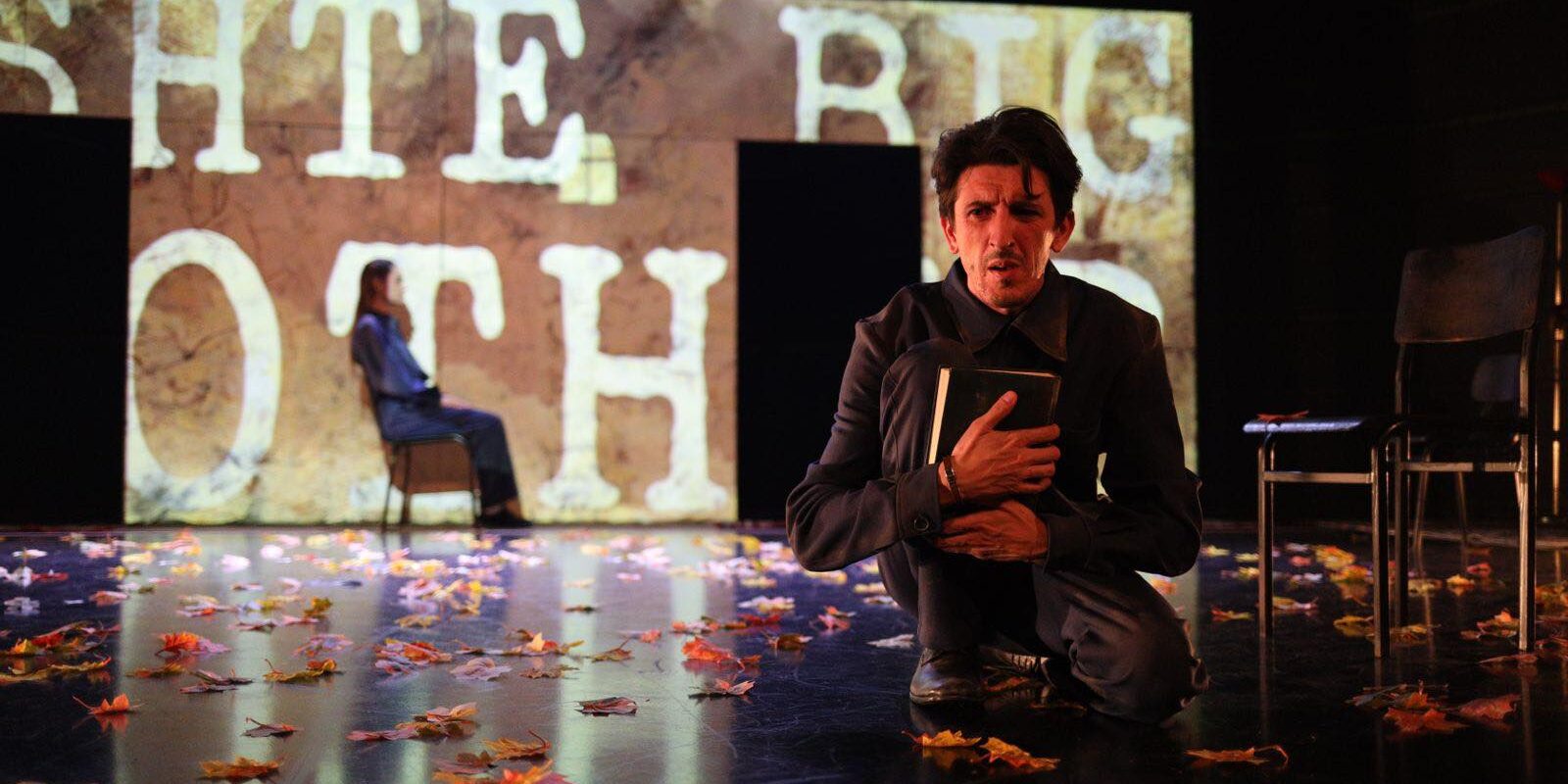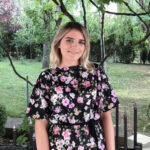National Theatre of Kosovo, premiere 30th September 2023
Would you prefer to be happy or free? This is one of the questions posed by 1984, the classic dystopian novel by George Orwell , which was brought to the stage for the first time in Kosovo by French director Igor Mendjisky in a production which displayed an innovative way of exploring the book’s main themes.
Orwell’s novel is set in an imagined future in which the fictious country of Oceania is ruled by a totalitarian regime known as Big Brother who use a variety of methods to control people’s daily lives.
Mendjisky zooms in on protagonist, Winston, a worker in the Ministry of Truth who dreams of rebellion against the system, and his forbidden love for Julia.
The show opens with all the actors seated on chairs. Alongside the characters of the novel there is also George Orwell (played by actress Arta Selimi) and an antagonistic art critic (played by Basri Lushtaku). To begin with cast where regular clothes, except the art critic who wears a cow’s costume, standing out from the rest. In one effective scene the art critic will demand accountability and ask both the cast and the audience to open their eyes to the powers which have taken everything from them.
Selimi’s Orwell mostly sits on a chair at the side of the stage reading out loud while writing the book, allowing the audience to keep track of the story. Actor Adrian Morina plays a narrator as well as skilfully embodying the character of O’Brien, who also works for the Ministry of Truth and later betrays Winston.
As Winston struggles to resist the Party’s propaganda and groupthink, he embarks on a clandestine affair with Julia who also hates the Party. When these two first meet, Mendjisky deploys melancholic music as all actors slowly throw autumn leaves on the floor, foreshadowing the bitter end that awaits the couple.
Mendjisky shows the different ways through which the Party controls its people, through surveillance and through language. Cameras are ubiquitous in every home, recording our every move. A particularly good scene depicts two children spying on their own mum, who is played with nuance by Edona Reshitaj. A digital screen in front of the audience takes different forms, becoming a TV screen, portraying how Big Brother monitors every aspect of the lives of the citizens. Cameras record the actors’ faces live on stage and this is interwoven with some previously recorded scenes, projecting the actors on the big screen before the audience, creating the effect of them constantly being monitored by the Party.
Language is constantly being rewritten by the Party, by people who work in special departments to change words, even the rhymes of the poets, and where reality cannot even be perceived through memory, because the Party has changed history. “Who controls the past controls the future. Who controls the present controls the past,” one of the Party representatives says.

1984 – National Theatre of Kosovo
In this society the individual is not allowed to think for herself or she will be judged to have committed a ‘thoughtcrime’. The thought police exists to think for all its people. The Party’s mission is to limit the capacity for thinking margins – there are less words every day in the vocabulary.
Later on, the actors are costumed (by Yllka Brada) in matching plain dark-blue boiler suits, which perfectly shows how they have subjugated themselves to the Party –unwittingly absorbing the Party’s propaganda and conforming to the Party’s reality. None of them display free will nor individual identity.
Room 101, the notorious room in which people are tortured by the Ministry of Love. Once people go there, they are never the same. The drama conveys people’s dread of this room, while showing the aftermath of this room on the characters of the play without showing us their experience inside the room.
In Orwell’s dystopia truth has become lies and love has is almost non-existent. The Party aims to remove truth and love from the human experience, therefore the act of love becomes a political act, an act of resistance.
Mendjisky’s use of music – especially People Are Strange – sometimes slows down and dilutes the intensity of the scenes, reducing the accumulation of emotion and diffusing the tension. However the production is still engaging and kept the audience hooked despite a two-hour running time, and Mendjisky hits on some truths that feel applicable in a world where freedom of expression is under threat and so many world governments use the internet to control and monitor the masses. Orwell’s ideas remain universal and timeless as they caution about a senseless world of fake news and government control.
The production also serves as a reminder that we have to take responsibility for retaining the memories we share with each other and the freedom that comes with them, while also asking us to take heed and not believe everything we see on our screens.
Overall, the production was as moving and impactful. Despite its grim topics, the main message is one of peace. “It is not important to be alive, but to be human,” we are reminded so many times during the play, true in Orwell’s time as it is now.
Credits:
Director: Igor Mendjisky//Scenographer: Mentor Berisha//Costume: Yllka Brada//Compser: Trimor Dhomi//Video: Yannik Donet//Translated by: Urim Nerguti
Actors: Flaka Latifi, Ylber Bardhi, Adrian Morina, Arta Selimi, Basri Lushtaku, Edona Reshitaj, Shpejtim Kastrati and Xhejlane Godanci.
Further reading: Interview with actor Adrian Morina: “I hope Kosovo can become more open-minded towards artists.”
Florida is a lover of words, and of art in all its forms: fiction, poetry and drama.








